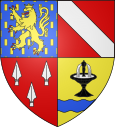Noirefontaine (Doubs)
| Noirefontaine | ||
|---|---|---|

|
|
|
| region | Bourgogne-Franche-Comté | |
| Department | Doubs | |
| Arrondissement | Montbeliard | |
| Canton | Valentigney | |
| Community association | Pays de Montbéliard agglomeration | |
| Coordinates | 47 ° 21 ' N , 6 ° 46' E | |
| height | 350-630 m | |
| surface | 3.35 km 2 | |
| Residents | 359 (January 1, 2017) | |
| Population density | 107 inhabitants / km 2 | |
| Post Code | 25190 | |
| INSEE code | 25426 | |
 Town hall and school building |
||
Noire Fontaine is a French municipality with 359 inhabitants (as of January 1 2017) in Doubs in the region Bourgogne Franche-Comté .
geography
Noirefontaine is located at 357 m , four kilometers south of Pont-de-Roide-Vermondans and about 18 km south of the city of Montbéliard (as the crow flies). The village extends in the Jura , in a valley widening of the Doubs near the mouth of the Barbèche, at the upper entrance into the gorge of the Doubs through the Lomont range , at the western foot of the Mont Écheroux.
The area of the 3.35 km² municipal area covers a section of the French Jura. The area is bounded in the west by the Doubs, which has formed a deep valley with a maximum of 1 km wide, flat valley floor. To the north of the village it breaks through the Lomont chain, which from a geological and tectonic point of view represents an anticline of the Jura folds . The steep valley slopes are criss-crossed by striking rocky outcrops. From the course of the river, the community area extends eastward over the valley and the adjacent slopes to the edge of the Clémont terrace. On the western slope of Mont Écheroux , the highest point of Noirefontaine is reached at 630 m.
Neighboring communities of Noirefontaine are Pont-de-Roide-Vermondans in the north, Montécheroux in the east, Liebvillers and Bief in the south and Dampjoux and Villars-sous-Dampjoux in the west.
history
From the 13th to the 15th century, Noirefontaine was ruled by the von Neuchâtel family . From around 1500 the village belonged to the dominion of Clémont under the sovereignty of the principality of Montbéliard , shared its fate and in 1748 came under French administration. The village does not have its own church, it belongs to the parish of Dampjoux.
population
| Population development | |
|---|---|
| year | Residents |
| 1962 | 252 |
| 1968 | 252 |
| 1975 | 292 |
| 1982 | 416 |
| 1990 | 404 |
| 1999 | 384 |
| 2014 | 395 |
With 359 inhabitants (as of January 1, 2017) Noirefontaine is one of the small communities in the Doubs department. After the population in the first half of the 20th century had always been in the range between 170 and 220 people, a significant increase in population was recorded, especially during the 1970s.
Economy and Infrastructure
Until well into the 20th century, Noirefontaine was a village dominated by agriculture (cattle and dairy farming, arable and fruit growing). In addition, there are now a few local small businesses, including a sawmill. Many workers are also commuters who work in the larger towns in the area.
The community has good transport connections. It is located on the D437 departmental road that leads from Montbéliard through the Doubstal to Maîche . There are other road connections with Villars-sous-Dampjoux, Liebvillers and Montécheroux.
literature
- Le Patrimoine des Communes du Doubs. Volume 2, Flohic Editions, Paris 2001, ISBN 2-84234-087-6 , pp. 932-933.
